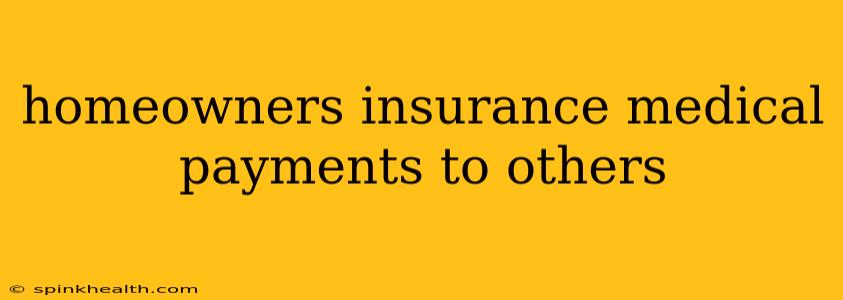Imagine this: a friend trips on your porch, a neighbor's child scrapes their knee on your sidewalk, or a delivery person slips on an icy patch near your front door. These seemingly minor accidents can quickly escalate into costly medical bills. That's where the often-overlooked but incredibly valuable medical payments to others coverage in your homeowners insurance policy comes in. It's a crucial safety net, protecting you from financial liability for injuries that occur on your property.
This isn't about fault; it's about providing immediate help. This coverage acts as a first aid kit for your liability, offering quick financial assistance for medical expenses, regardless of who's at fault. Let's delve deeper into this essential aspect of homeowners insurance.
What Does Medical Payments to Others Coverage Actually Cover?
This coverage specifically pays for the reasonable medical expenses of others injured on your property, or as a result of your actions (like accidentally hitting someone with a golf ball while playing in your backyard). This includes things like:
- Doctor visits: Costs associated with medical examinations and treatment.
- Hospital stays: Expenses related to inpatient care.
- Surgery: Costs for surgical procedures.
- Physical therapy: Fees for rehabilitation and recovery treatments.
- Prescription medications: The cost of prescribed drugs related to the injury.
- Ambulance services: Charges for emergency medical transportation.
It's important to note that this isn't a liability coverage. It doesn't protect you from lawsuits. It simply pays for the medical bills up to your policy's stated limit, regardless of who is responsible for the accident.
How Much Coverage Do I Need?
The amount of medical payments coverage you need depends on several factors, including the size of your property, the frequency of visitors, and your personal risk tolerance. While there's no magic number, most insurance companies offer coverage limits ranging from $1,000 to $25,000. It's a good idea to discuss your specific needs with your insurance agent to determine the appropriate level of coverage for your situation.
What Isn't Covered Under Medical Payments to Others?
While this coverage is incredibly helpful, it does have limitations. It typically doesn't cover:
- Your own medical expenses: This coverage is solely for the medical bills of others.
- Long-term care: Expenses related to extensive rehabilitation or ongoing medical treatment beyond a reasonable period.
- Pain and suffering: Compensation for emotional distress or discomfort caused by the injury.
- Lost wages: Compensation for income lost due to the injury.
- Property damage: Costs associated with repairs or replacements of damaged property.
How Does it Work in Practice?
Let's say a guest slips and falls on your icy driveway. You would notify your insurance company immediately. They'll investigate the claim, and if it's covered under your medical payments to others coverage, they'll work directly with the injured person's medical providers to pay their bills up to your policy's limit.
What if the Injury is My Fault?
Even if you're at fault, your medical payments to others coverage will still likely pay for the injured party's medical expenses up to the policy limit. However, this doesn't absolve you of further liability. If the injuries are severe or the injured party pursues legal action, you might still face a lawsuit and need additional liability coverage.
How Does Medical Payments to Others Coverage Differ from Liability Coverage?
This is a key distinction. Medical payments to others coverage is designed for quick payouts for medical expenses, regardless of fault. Liability coverage, on the other hand, protects you financially if you are found legally responsible for someone's injuries or property damage. Liability coverage would cover legal fees, judgments, and settlements associated with a lawsuit. It's advisable to have both.
Can I Increase My Medical Payments Coverage?
Absolutely! Talk to your insurance provider about increasing your medical payments coverage. It's often a relatively inexpensive way to add significant protection to your homeowners insurance policy. A slightly higher premium might provide you peace of mind, knowing you're better protected against unexpected medical expenses for those injured on your property.
In conclusion, medical payments to others coverage in your homeowners insurance policy is a valuable, often overlooked, benefit that can provide crucial financial assistance in the event of an accident on your property. Don’t underestimate its importance – it's a small investment that can provide significant protection and peace of mind.

